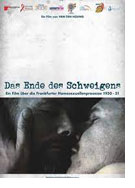

Opening 2 Dec 2021
Directed by:
Van-Tien Hoang
Writing credits:
Holger Heckmann, Van-Tien Hoang
Principal actors:
Christoph Stein, Nicole Goebel, Wolf Gerhardt, Marco Linguri, Eric Lenke
Otto Blankenstein, a teen prostitute in Frankfurt am Main, is arrested by the police in the early 1950s. Cutting a deal with the authorities, he reveals the names of his clients. By so doing, he destroys the lives of more than 200 homosexual and bisexual men in the West German city.
This is the jumping-off point for The End of Silence (Das Ende des Schweigens), a docudrama by the first-time director van-Tien Hoang. The film delves into the relatively unknown story of Frankfurt am Main’s homosexual trials of 1950-51, uncovering previously undisclosed, sometimes shocking details of those trials in the process.
With a chillingly systematic approach reminiscent of Nazi rule, the male homosexual community of Frankfurt – considered the largest in the Federal Republic of Germany at the time – was persecuted over the course of this 10-month-long trial. Interviews with historians, activists and a sole surviving persecuted man named Wolfgang Lauinger are interspersed with a docudrama-style reenactment of events to bring this story to life for filmgoers.
To date, little attention has been paid to this episode in post-war German history. Even natives of the city of Frankfurt are unfamiliar it. Van-Tien Hoang first heard of it in 2015, when he saw a photo of Frankfurt’s Goethe Tower on Facebook that referred to a suicide. One of the men persecuted in that 1950 trial had, out of desperation, jumped from the tower to his death.
Investigating further, Hoang made it his mission to reconstruct this oppressive piece of contemporary history. A crowdfunding campaign made the project possible.
In interviews, historians Christian Setzepfandt and Gottfried Lorenz emphasize throughout the film that this brutal hunt for homosexuals was in accordance with the law at the time. The meticulous persecution of gays and bisexuals was legalized because Paragraph 175 of the German Criminal Code, actually a relic from the Kaiser era, wasn’t classified as a Nazi injustice by the Allies after the defeat of Adolf Hitler’s regime. (It remained in force until 1994).
So the state’s public prosecutor and its chief justice – the same people who were known for having taken massive action against homosexuals under the Nazis – systematically exploited this legal situation after the war for their homophobic crusade. And their maneuvers were even expressly approved by the state’s then-governor, the Social Democrat Georg-August Zinn.
The details recalled by Lauinger, 97 at the time of being interviewed, are bone-chilling and the most moving part of the film. Scenes recreated with actors in gay bars or during police interrogations, on the other hand, take some getting used to. Partly the acting is to blame; relying on crowd funding, Hoang most likely couldn’t spend a lot on these cinematic recreations.
That awkwardness aside, the film is worth watching, particularly for anyone interested in learning more about LGBTQ history, German post-war history, or the continuities between the murderous Nazi regime and the young Federal Republic of Germany.
The film even holds valuable lessons about the connection between right-wing ideology and homophobia, lessons that are valuable not only in a historical perspective but for our current times. (Deborah Steinborn)